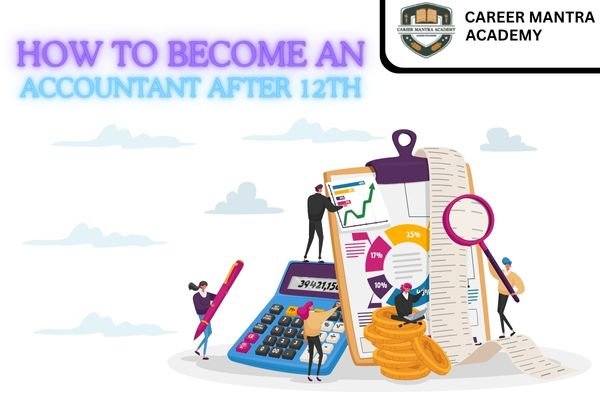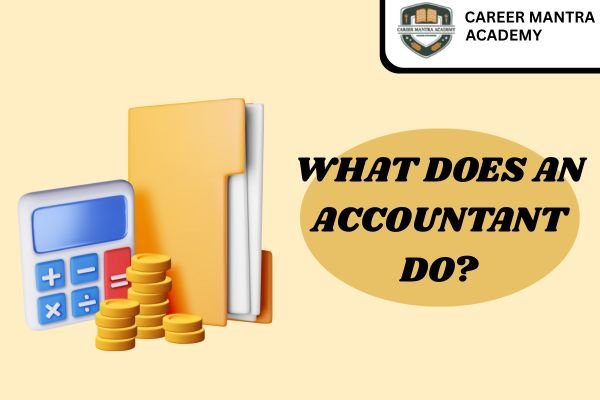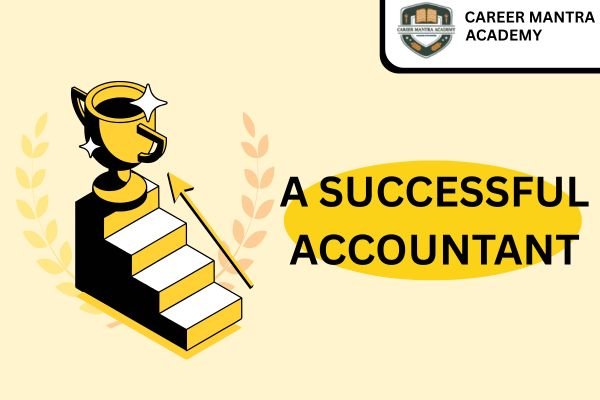
For Applying Accountancy Course Click Here…
How to become an accountant after 12th:
Accounting is among the most promising and career-focused fields available to students after completing their 12th-grade education. Accountants are essential in handling money, creating reports, keeping track of documents, and helping people or companies make wise financial decisions. The need for qualified accountants is growing quickly due to the expansion of industries, start-ups, and international trade, making it a fulfilling career choice.
Students typically choose the commerce stream, which provides a solid foundation in subjects like accounting, business studies, and economics, to pursue careers as accountants after completing their 12th-grade education. However, if they are truly interested, students from science or the arts can also take accounting courses. Depending on the student’s objectives, there are several career options, including a B.Com. In accounting, Chartered Accountancy (CA), Cost and Management Accounting (CMA), ACCA, or diploma programs.
In addition to a formal education, becoming an accountant requires critical abilities like analytical thinking, problem-solving, attention to detail, and numerical proficiency. To help you understand how to build a successful career as an accountant after 12th grade, we will go over eligibility, courses, the step-by-step process, career scope, salary, and future opportunities in this blog.

What Does an Accountant Do?
A professional who oversees and evaluates financial data for people, companies, or organizations is known as an accountant. Their main duty is to guarantee the organization’s financial stability, timely tax payments, and accurate financial records. By offering insights based on financial data, accountants play a critical role in decision-making.
Some of the key responsibilities of an accountant include:
- Maintaining Financial Records: Recording daily transactions such as income, expenses, assets, and liabilities.
- Preparing Financial Statements: Creating balance sheets, profit and loss accounts, and cash flow statements to show the financial position of a business.
- Tax Management: Calculating and filing taxes, ensuring compliance with government rules and regulations.
- Budgeting and Forecasting: Assisting businesses in planning future expenses, investments, and savings.
- Auditing and Verification: Checking financial documents to ensure there are no errors or fraud.
- Advisory Role: Offering financial advice for cost-cutting, investment planning, and business growth.
In short, accountants are not just number-crunchers; they are financial planners and advisors who help organizations make smarter financial decisions. Their work directly influences the stability and growth of businesses in every industry.
Why Choose Career Mantra Academy for Accounting After 12th?
Just as crucial as picking a career path is picking the correct institution. Because it provides a combination of academic strength, real-world experience, and freshmen-focused support services, Career Mantra Academy stands out for students wishing to pursue accounting after 12th grade. Here are a few explanations for why this academy might be the best option:
- Structured Curriculum with Basic to Advanced Topics — The academy ensures that students start from fundamentals (accounting basics, business studies) and steadily move toward more advanced topics (financial accounting, taxation, auditing). This helps those straight after 12th build a solid foundation without feeling overwhelmed.
- Experienced Faculty and Mentors — Teachers and mentors with industry experience help bridge the gap between theoretical learning and what’s needed in real jobs (software tools, live case studies, actual financial situations).
- Practical Training & Hands-On Tools — Courses often include practice with accounting software, real-world exercises (ledgers, GST returns, income tax), and sometimes internships or projects that help you see how accounting is done in businesses.
- Placement & Career Guidance Support — Many students are guided on resume preparation, interview prepping, job roles, and growth paths in accounting. Support in placement or setting up internships gives fresh students a head start.
- Flexible Learning Options — Whether you prefer classroom coaching, online sessions, weekend batches, or a blended format, the academy offers options to suit different learning styles and schedules.
- Affordable Fees & Scholarship/Support Options — For students coming right after 12th, costs and financial support matter. Career Mantra usually offers competitive pricing, installments, or scholarship aids to make the path more accessible.
What Are the Eligibility Criteria to Become an Accountant After 12th?
After high school, becoming an accountant is a common career choice, particularly for students studying commerce. To begin your accounting career, you must meet certain general eligibility requirements, though these may change based on the course you select.
Basic Eligibility Requirements:
- Educational Qualification: Students must have completed their 12th standard from a recognized board. Commerce stream with subjects like Accountancy, Business Studies, and Economics is preferred, but students from science or arts backgrounds can also pursue accounting courses.
- Minimum Marks: Most colleges require at least 50% marks in 12th, though top institutes may have higher cutoffs.
- Subject Preference: Having Mathematics or Accountancy in 12th is an added advantage, especially for courses like B.Com (Hons.), CA, or CMA.
- Entrance Exams: For professional courses such as CA (Chartered Accountancy), CMA, or ACCA, students need to clear specific entrance exams after 12th.
- Age Limit: There is usually no strict age limit; however, candidates should be at least 17 years old to apply for higher education courses.
5. Which Are the Best Courses to Become an Accountant After 12th?
1. Chartered Accountant (CA)
CA is the most popular course for aspiring accountants in India. Conducted by ICAI, it focuses on taxation, auditing, corporate law, and financial management. It’s considered one of the toughest but most rewarding career paths.
Eligibility
- Must pass 12th from a recognized board (preferably Commerce).
- Must appear for the CA Foundation exam after 12th.
Career Opportunities
- Auditor, Tax Consultant, Financial Advisor, CFO, Compliance Officer.
- High demand in Big 4 firms, MNCs, banks, and corporates.
Salary Expectations
- Fresher CA: ₹7–10 LPA in India.
- With experience: ₹20–30 LPA or higher.
2. Association of Chartered Certified Accountants (ACCA)
ACCA is a UK-based qualification recognized in 180+ countries. It’s often called “Global CA” and is highly valued by MNCs.
Eligibility
- 12th pass with 50% in Commerce (Maths/Accounts preferred).
- Non-commerce students may need to clear foundation modules.
Career Opportunities
- Global roles in finance, auditing, taxation, and risk management.
- Opportunities in Big 4, investment banks, and international MNCs.
Salary Expectations
- In India: ₹6–10 LPA for freshers.
3. Chartered Financial Analyst (CFA)
CFA is a US-based program focusing on investment banking, portfolio management, and financial analysis. It’s ideal for students wanting to enter global finance.
Eligibility
- Students can register in the final year of graduation.
- But 12th pass students can start preparing early.
Career Opportunities
- Roles in investment banks, hedge funds, equity research, and portfolio management.
- Strong demand in finance hubs like Mumbai, Singapore, London, and New York.
Salary Expectations
- In India: ₹8–15 LPA starting.
4. Financial Risk Manager (FRM)
FRM is offered by GARP (USA) and is focused on risk analysis, market risk, credit risk, and operational risk.
Eligibility
- No formal requirement, but graduation is recommended.
- Students after 12th can begin preparation.
Career Opportunities
- Risk Analyst, Risk Manager, Treasury Professional, Quantitative Analyst.
- Banking & financial services sector.
Salary Expectations
- In India: ₹8–12 LPA.
5. Certified Public Accountant (CPA)
CPA is the American equivalent of CA, offered by AICPA. It is globally recognized and in high demand among MNCs.
Eligibility
- A bachelor’s degree (B.Com + CA/CMA preferred).
- Students after 12th can plan their pathway with B.Com + CPA.
Career Opportunities
- Auditor, Tax Consultant, Financial Controller, US Tax Specialist.
- Popular in the US, Canada, the Middle East, and Big 4 firms.
Salary Expectations
- India: ₹7–12 LPA starting.
6. Cost and Management Accountant (CMA)
CMA is offered by ICMAI in India. It focuses on cost accounting, strategic management, and decision-making.
Eligibility
- 12th pass from a recognized board.
- Must appear for the CMA Foundation.
Career Opportunities
- Cost Accountant, Management Accountant, Financial Analyst.
- Growing demand in manufacturing and corporations.
Salary Expectations
- Fresher: ₹5–8 LPA.
- With experience: ₹15–20 LPA.
7. Company Secretary (CS)
CS is offered by ICSI in India. It focuses on corporate governance, law, and compliance.
Eligibility
- 12th pass from any stream.
- Must clear the CSEET exam.
Career Opportunities
- Compliance Officer, Legal Advisor, Corporate Consultant.
- High demand in companies, law firms, and government bodies.
Salary Expectations
- Fresher: ₹4–6 LPA.
- Senior roles: ₹15–25 LPA.
8. Post Graduate Diploma in Applied Statistics with Software (PGDASS)
PGDASS is a specialized course combining statistics, data, and financial software applications.
Eligibility
- Generally requires graduation, but some institutes allow a 12th pass with a strong math background.
Career Opportunities
- Data Analyst, Financial Analyst, Actuarial Assistant.
- Scope in insurance, research, and consulting.
Salary Expectations
- India: ₹3–6 LPA starting.
9. Diploma in Accounting and Finance
Short-term diploma for students who want a quick entry into accounting jobs after 12th.
Eligibility
- 12th pass from any stream. Commerce is preferred.
Career Opportunities
- Accounts Assistant, Junior Accountant, GST Executive.
- Entry-level roles in small firms and companies.
Salary Expectations
- India: ₹2–4 LPA starting.
- With experience: ₹5–7 LPA.
What Is the Step-by-Step Process to Become an Accountant After 12th?
After completing grade 12, becoming an accountant requires a methodical path of study, certification, and real-world experience. Accounting is the foundation of business and helps organizations make important financial decisions. It is not just about numbers. Here is the detailed procedure to help students transition from high school to a career in professional accounting:
Step 1: Complete Your 12th Education
Completing the 12th grade is the first step towards any accounting career. Students studying commerce benefit from the foundational knowledge needed for professional accounting courses, which is provided by courses like accounting, economics, business studies, and mathematics. However, with further training in accounting principles, students with backgrounds in the arts or sciences can also pursue accounting. Gaining admission to reputable professional programs and developing the analytical and numerical skills necessary for the future are two benefits of doing well in the 12th grade.
Step 2: Decide on the Right Accounting Course
Choosing a course that supports your career goals is a crucial next step after completing your 12th-grade education. Professional courses such as Chartered Accountancy (CA), Cost and Management Accounting (CMA), ACCA, CPA, and CFA are available as options. Niche fields are served by specialized certifications like Post Graduate Diploma in Applied Statistics with Software (PGDASS), Company Secretary (CS), and Financial Risk Manager (FRM). Students can also acquire practical skills for instant job entry with short-term accounting and finance diplomas. Your interests, financial situation, and long-term goals should all play a role in the decision.
Step 3: Register for the Chosen Course
After choosing a course, you must register with the appropriate institution or governing body. ACCA and CPA candidates register through their international portals, CMA candidates register with ICMAI, CA candidates register with ICAI, and diploma courses are registered directly with colleges or institutes. Students must present their academic records, identification, and photos at the time of registration. The first step in lawfully pursuing the selected professional qualification is proper registration.
Step 4: Clear the Foundation or Entry-Level Exam
The majority of professional courses start with an entrance exam. The fundamentals of accounting, business law, economics, and management are covered in these tests. Students who complete the foundation level will be prepared to move on to more difficult subjects at the intermediate level. Additionally, it lays the foundation for the development of analytical and problem-solving abilities that are essential for accounting.
Step 5: Advance to Intermediate or Professional Level
Students advance to the intermediate or professional stage of their chosen course after passing the foundational exam. The curriculum gets more thorough at this level. Financial management, taxation, corporate law, and auditing standards are all studied by CA students. Cost accounting, strategic management, and business decision-making are the main areas of concentration for CMAs. International accounting standards, management accounting, and advanced financial reporting are taught to ACCA and CPA candidates. In order to help students develop practical skills, this stage frequently also involves practical exposure to accounting software like Tally, SAP, and QuickBooks.
Step 6: Gain Practical Experience or Articleship
A career in accounting requires practical experience. A three-year articleship under an active chartered accountant is required of CA students. While CS students learn about corporate governance and compliance, CMA candidates intern at manufacturing or corporate companies. It is recommended that ACCA and CPA candidates obtain practical experience in finance, auditing, or accounting departments. Students gain professional skills, increase employability, and comprehend how theoretical concepts are applied through this hands-on training.
Step 7: Prepare for Final-Level Exams
Students take the final exams for their courses after receiving hands-on training. Auditing, advanced taxation, corporate law, and financial management are all covered in the CA final exams. Strategic cost management and decision-making are the main topics of the CMA final exams. The final ACCA and CPA modules assess professional ethics, advanced financial analysis, and international accounting standards. The CFA Level III places a strong emphasis on wealth planning, portfolio analysis, and investment management. By passing these final tests, the student proves that they possess the technical know-how and proficiency needed for professional practice.
Step 8: Obtain Certification and Membership
Students obtain certification and membership in their respective professional bodies upon passing exams and completing practical training. ACCA, CPA, and CFA holders obtain internationally recognized credentials, and CA members join ICAI, and CMA members join ICMAI. Membership enables people to work in corporate finance positions, provide consulting services, or engage in professional practice. Additionally, it calls for adherence to professional ethics and might entail ongoing education to improve skills.
Step 9: Start Building a Career and Gaining Experience
After earning their certification, accountants can work as auditors, tax consultants, financial analysts, corporate accountants, and investment professionals, among other positions. Exposure to corporate settings, financial operations, and client handling is offered by entry-level jobs. Professionals can eventually advance to more senior positions like consultant, CFO, financial manager, or financial controller. Internships, networking, and further skill development can boost professional advancement and lead to better-paying jobs.
Step 10: Pursue Specializations or Advanced Courses
Accountants can decide to specialize in areas like corporate governance, investment banking, risk management, taxation, or financial data analytics after gaining experience. Specializations provide specialized knowledge, boost employability, and frequently result in global career opportunities. Accountants can maintain their competitiveness in a changing global market by pursuing ongoing education and certifications in advanced taxation, accounting software, or financial planning.
What are the Course names, Career Options, and Annual Salary (INDIA) of Accountants?
| Course Name | Career Options | Annual Salary (India) |
| Chartered Accountant (CA) | Auditor, Tax Consultant, Financial Advisor, CFO, Compliance Officer | ₹7–10 LPA (Fresher), ₹20–30 LPA+ (Experienced) |
| Association of Chartered Certified Accountants (ACCA) | Financial Analyst, Auditor, Tax Consultant, Risk Manager | ₹6–10 LPA (Fresher), ₹15–25 LPA (Experienced) |
| Chartered Financial Analyst (CFA) | Investment Banker, Portfolio Manager, Equity Analyst, Financial Consultant | ₹8–15 LPA (Fresher), ₹25–50 LPA+ (Experienced) |
| Financial Risk Manager (FRM) | Risk Analyst, Risk Manager, Treasury Professional, Quantitative Analyst | ₹8–12 LPA (Fresher), ₹20–30 LPA+ (Experienced) |
| Certified Public Accountant (CPA) | Auditor, Tax Consultant, Financial Controller, US Tax Specialist | ₹7–12 LPA (Fresher), ₹20–30 LPA+ (Experienced) |
| Cost and Management Accountant (CMA) | Cost Accountant, Management Accountant, Financial Analyst | ₹5–8 LPA (Fresher), ₹15–20 LPA (Experienced) |
| Company Secretary (CS) | Compliance Officer, Legal Advisor, Corporate Consultant | ₹4–6 LPA (Fresher), ₹15–25 LPA (Experienced) |
| PG Diploma in Applied Statistics with Software (PGDASS) | Data Analyst, Financial Analyst, Actuarial Assistant | ₹3–6 LPA (Fresher), ₹10–15 LPA (Experienced) |
| Diploma in Accounting and Finance | Accounts Assistant, Junior Accountant, GST Executive | ₹2–4 LPA (Fresher), ₹5–7 LPA (Experienced) |

Which Skills Are Required to Become a Successful Accountant?
It takes both technical knowledge and soft skills to succeed as an accountant. Accurately managing financial data, creating reports, and identifying trends are made easier with strong numerical and analytical abilities. Errors in taxation and accounting are reduced when attention to detail is maintained. It is becoming more and more crucial to be proficient with accounting software such as Tally, SAP, or QuickBooks. Accountants with strong communication skills can clearly explain financial data to management and clients. To manage several tasks, adhere to deadlines, and keep accurate records, time management and organizational abilities are essential. Furthermore, in today’s cutthroat market, a successful accountant must possess critical qualities like ethical integrity, problem-solving skills, and flexibility in response to shifting financial regulations.
Conclusion.
After completing grade 12, becoming an accountant can lead to a fulfilling, exciting career with a variety of options. Students can choose from a variety of career paths, from conventional courses like CA and CMA to internationally recognized programs like ACCA, CPA, and CFA, provided they have the appropriate education, professional certifications, and real-world experience. Both in India and overseas, accounting provides excellent career growth, high earning potential, and opportunities. Dedication, analytical abilities, meticulousness, and ongoing education to stay current with changing financial laws and technological advancements are necessary for success in this field. Students can create a secure, well-respected, and successful career in accounting and finance by carefully choosing the right course, obtaining real-world experience, and honing critical skills.
FAQs
Can a 12th pass become an accountant?
Yes, a 12th pass can become an accountant. After completing 12th, students can pursue courses like CA, CMA, ACCA, CPA, CS, or diploma programs in accounting and finance. With the right education, practical training, and skills, they can build a successful career in accounting, taxation, auditing, and finance.
Which course is best for an accountant after 12th?
The best course for an accountant after 12th depends on career goals. CA is ideal for India-focused accounting, ACCA or CPA for global opportunities, and CMA for cost and management accounting. For quick entry, diplomas in accounting and finance provide practical skills and job readiness.
What is the qualification of an accountant?
The basic qualification to become an accountant is completing 12th with Commerce. For professional growth, certifications like CA, CMA, ACCA, CPA, CFA, or CS are preferred. Knowledge of accounting principles, taxation, and auditing, and proficiency in accounting software, enhances career prospects and eligibility for higher-level accounting roles.
What are the 4 types of accountants?
The four main types of accountants are public accountants (audit and tax services), management accountants (internal financial analysis), government accountants (public sector auditing), and internal auditors (risk and compliance monitoring).
How many attempts for CA?
There is no limit to the number of attempts for CA exams. Students can attempt CA Foundation, Intermediate, and Final exams multiple times until they pass. Each attempt requires registration and exam fees, and consistent preparation is key, as CA exams are known for their challenging syllabus and rigorous evaluation.
What is the salary of an accountant in India?
The salary of an accountant in India varies with experience and qualifications. A fresher can earn ₹2–5 LPA, while certified professionals like CA, CMA, or ACCA can earn ₹7–15 LPA. Senior roles such as Finance Manager or CFO can receive ₹20–30 LPA or more, depending on the organization.
